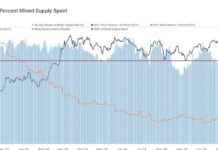MADRID, 10 Jun. (EUROPA PRESS) –
The rating agency Fitch Ratings has confirmed this Friday the solvency note ‘A-‘ with a stable outlook for Spain’s long-term sovereign debt, as announced by the risk rating agency.
Fitch has highlighted that Spain has “an economy with high added value” and “solid governance indicators”, but has warned that the high levels of public debt “limit the ratings” because, as it has explained, the recovery in growth of the Nominal GDP will result “in a decrease in public debt in proportion to GDP until 2023.”
The risk rating agency has also emphasized the downward revision of growth forecasts that “slowed down sharply in the first quarter”, for which it is confident that the pace will recover in the third and fourth quarters “with an increase in capital spending” related to the Recovery Plan and “a continued recovery of tourism that boosts exports”.
In Fitch’s opinion, these two elements will drive “a real GDP growth forecast of 4.4% this year, which is a marked downward revision” from the 6.3% forecast they made in 2021. “We forecast GDP growth of 3.3% for the full year, which implies that real GDP will not reach its pre-pandemic level until the third quarter of 2023,” he stressed.
At another point, the agency has assessed the recovery of the labor market and the labor reform promoted by the Government, highlighting that the unemployment rate decreased in 2021 to 13.4% in December, it was 15.9% in January and has remained close to that rate ever since, so they expect that data to decline “slightly” in 2023.
Fitch has also warned of the increase in inflation in recent months, which it expects to reduce from the middle of the year due to the gas price cap in Spain and Portugal, reaching 4.4% by the end of 2022.
“Risks to our growth projections are firmly skewed to the downside and inflation forecasts to the upside. In our baseline forecast, energy prices are expected to decline in the second half of this year and the next,” he explained. The agency has warned that a “persistent increase in energy prices would further weaken real income and, consequently, consumption.”
Likewise, the risk rating agency has stressed that the deficit “will be reduced at a slower rate” and, according to their estimates, they foresee that “it will be reduced at a substantially lower rate than expected in December”, to 5.1% of GDP instead of 4.4%. In this review, he clarified, are the macroeconomic perspectives and the political decisions after the Executive announced in March the aid package in response to the war in Ukraine.
This, according to Fitch, will increase the deficit in 2022 by around €6 billion — around 0.5% of GDP — while in 2023, the deficit is expected to shrink further, to 4.1%. of GDP.








